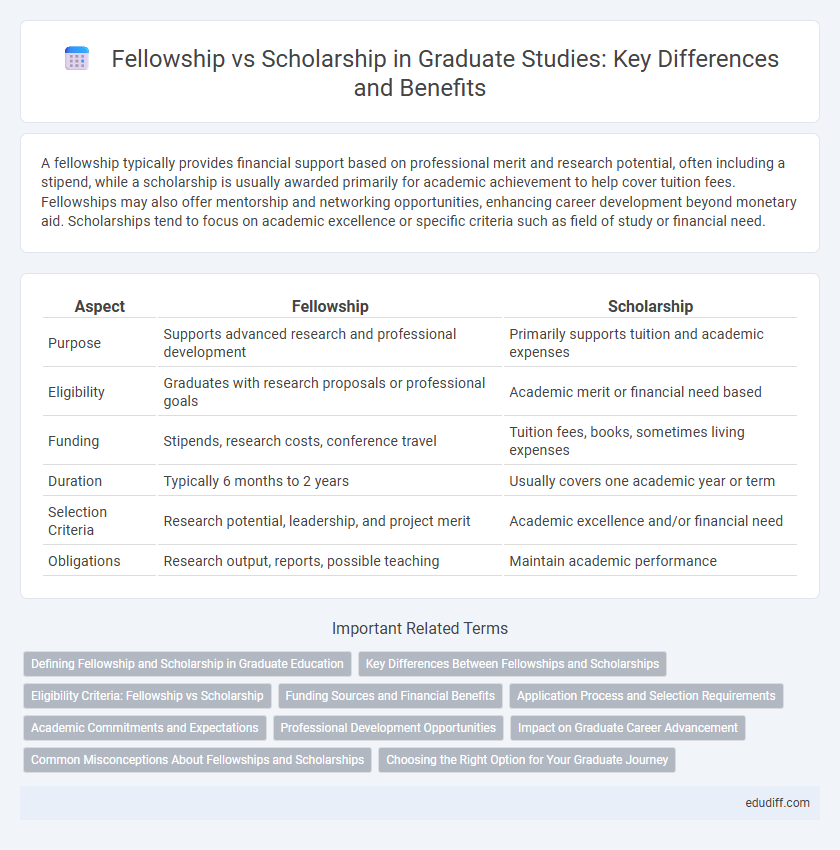A fellowship typically provides financial support based on professional merit and research potential, often including a stipend, while a scholarship is usually awarded primarily for academic achievement to help cover tuition fees. Fellowships may also offer mentorship and networking opportunities, enhancing career development beyond monetary aid. Scholarships tend to focus on academic excellence or specific criteria such as field of study or financial need.
Table of Comparison
| Aspect | Fellowship | Scholarship |
|---|---|---|
| Purpose | Supports advanced research and professional development | Primarily supports tuition and academic expenses |
| Eligibility | Graduates with research proposals or professional goals | Academic merit or financial need based |
| Funding | Stipends, research costs, conference travel | Tuition fees, books, sometimes living expenses |
| Duration | Typically 6 months to 2 years | Usually covers one academic year or term |
| Selection Criteria | Research potential, leadership, and project merit | Academic excellence and/or financial need |
| Obligations | Research output, reports, possible teaching | Maintain academic performance |
Defining Fellowship and Scholarship in Graduate Education
Fellowships in graduate education are merit-based awards providing financial support, often combined with research or teaching responsibilities, to advance a student's academic and professional development. Scholarships primarily offer financial aid based on academic excellence, merit, or specific criteria without necessitating work obligations, facilitating the pursuit of graduate studies. Both fellowships and scholarships alleviate educational expenses but differ in scope, eligibility, and expectations within graduate programs.
Key Differences Between Fellowships and Scholarships
Fellowships typically provide funding for graduate-level research or professional development, often including a stipend and opportunities for mentorship, whereas scholarships primarily offer financial aid based on academic merit or need to support tuition and fees. Fellowships usually require active engagement in specific projects or research, while scholarships generally do not impose such obligations. The duration and eligibility criteria also differ, with fellowships often being more specialized and competitive compared to scholarships.
Eligibility Criteria: Fellowship vs Scholarship
Fellowship eligibility often targets graduate students engaged in research, requiring a strong academic record, research proposal, and sometimes professional experience in the field. Scholarships typically focus on academic merit, financial need, or specific demographic criteria, with less emphasis on research involvement. Both require enrollment in an accredited institution, but fellowships prioritize research potential while scholarships emphasize academic achievement and financial support.
Funding Sources and Financial Benefits
Fellowships and scholarships both provide essential funding for graduate studies but differ primarily in their sources and financial benefits. Fellowships are often funded by universities, research institutions, or private organizations and typically include stipends, research grants, and tuition waivers, offering comprehensive financial support. Scholarships are commonly sponsored by educational foundations, government programs, or corporations, providing monetary awards that primarily cover tuition costs with fewer additional benefits.
Application Process and Selection Requirements
Fellowship applications typically require a detailed research proposal and evidence of significant academic achievements, emphasizing originality and potential impact. Scholarship selection criteria often prioritize academic excellence, financial need, and extracurricular involvement, with a straightforward application including transcripts and recommendation letters. Both processes demand thorough preparation, but fellowships usually involve a more rigorous review by specialized committees focused on research relevance and candidate expertise.
Academic Commitments and Expectations
Fellowships typically provide graduate students with financial support alongside professional development opportunities, requiring recipients to engage in specialized research, teaching, or service commitments that advance their academic careers. Scholarships primarily offer financial aid based on merit or need, with fewer mandatory responsibilities, allowing recipients to focus predominantly on coursework and degree completion. Understanding these differences helps graduates balance funding options with their academic obligations and career goals.
Professional Development Opportunities
Fellowships provide graduate students with immersive professional development opportunities, including mentorship, research funding, and networking within specialized fields. Scholarships primarily offer financial support for tuition and academic expenses, with limited emphasis on career advancement resources. Access to fellowships often enhances leadership skills and industry connections crucial for post-graduate career growth.
Impact on Graduate Career Advancement
Fellowships provide funded opportunities for graduate students to engage in advanced research or specialized training, often leading to enhanced professional networks and increased job prospects in academia or industry. Scholarships primarily offer financial support based on merit or need, reducing economic barriers but may lack the structured mentorship and experiential components of fellowships. Securing a fellowship can accelerate career advancement by fostering leadership skills, publishing opportunities, and direct collaboration with experts in the field.
Common Misconceptions About Fellowships and Scholarships
Fellowships and scholarships are often confused, but fellowships typically provide funding tied to specific research or professional development activities, while scholarships generally focus on tuition support based on academic merit or financial need. Many graduate students misunderstand that fellowships require active contribution to a project or institution, whereas scholarships are usually awarded without work obligations. Clarifying these distinctions helps candidates target appropriate opportunities and optimize their funding strategy during graduate studies.
Choosing the Right Option for Your Graduate Journey
Selecting between a fellowship and a scholarship for your graduate studies depends on your academic goals and financial needs. Fellowships often provide funding tied to research or teaching responsibilities, offering both stipends and professional development opportunities, while scholarships are typically merit-based awards without work obligations. Evaluating eligibility criteria, funding amount, and program requirements ensures you choose the most beneficial support for your graduate journey.
Fellowship vs Scholarship Infographic

 edudiff.com
edudiff.com